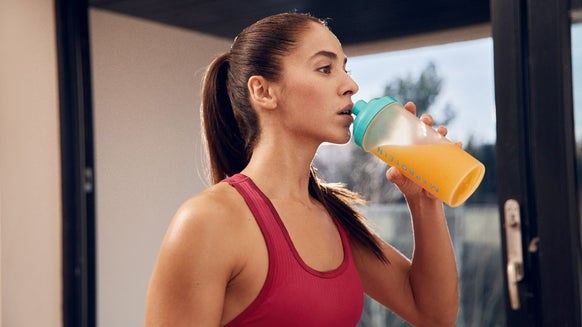Why Do You Look Like You’ve Gained Weight After Exercise?

Weight Gain After Exercise
If your goal is weight loss, and you’re doing your best to eat right and exercise, feeling like you’re gaining weight can be really disheartening.
It’s not a matter of body type or luck, but generally the result of not enough cardiovascular exercise (the stuff that gets your blood pumping), plus a lack of core and muscle strengthening. It also can be due to an off-balance between your caloric intake, and what you burn off. So don’t worry – it’s not going downhill!

If you’ve been spending a lot of time on the sofa, or have taken a long rest from a considerably more active routine, then your muscle definition and volume will likely have changed, depending on how long you’ve been away.
Pumping up muscles is a bit like blowing up a balloon. When you perform many sets with high reps, your muscles will start to swell and feel full. This is known as the pump.
If you’ve fallen out of your usual gym routine, your muscles won’t be worked as much as before and will, therefore, shrink in volume. And if you haven’t been getting much cardio in during your time off, you’ll have likely gained in body fat, whilst losing muscle.
Why you may have weight gain after exercise
The Pump
Water Retention
Water retention can be another reason you look like you’ve gained weight post-workout. When we push our muscles, we cause micro-tears (in addition to inflammation), and repairing our muscles requires both water and protein.
Muscles hold more water than tissue, and require water to help flush out toxins post-exercise. And of course, whilst we exercise, we’re usually drinking a lot of water, as we should be. Don’t be alarmed by water retention - drinking more helps your body continue to flush it out and lessen water retention over time.
So, your muscles have pumped up but your excess body fat has remained.
People commonly see this in the abs area, having done several sets of sit-ups and a bit of running, only to find when they sit down exhausted at the end of the day that their physique is the same.
The answer is patience. A toned physique doesn’t happen overnight, and there are a few things to bear in mind if you’re not seeing the progress that you want. So, let’s break this down into areas that you can address:
Solutions
Diet
We’re starting out with diet. A common misconception is that you need to go on a fad or extreme diet in order to lose weight.
But your muscles need protein to recover and develop, and your body needs all of the other macro and micronutrients to function properly. Exercising hungry is like a car running on empty. Fuel your ambition, and make sure your body gets the nutrition it needs.
Carbs are our body’s primary energy source - required for a good workout. A rough guide is to aim to get around 45-50% of your daily calories from carbs (although this varies person-to-person). When you’re lifting, your muscles need both carbs and plenty of protein to recover and build - aim for 1g of protein per kg of body weight and the remainder of your calories should come from healthy fats.
Check out our macro calculator if you need help getting started.
If you’re conscious of weight gain, our diet isolate shake will help you stay on track, and absorb quickly into the body. In terms of putting on weight, this is the result of either consuming more or burning off fewer calories – or a combination of the two. Weight loss should be planned over a longer period of time to ensure its sustainable and a healthy rate of weight loss.
Cardio Exercise
While building muscle helps you increase your metabolism and burn more calories over time, the quickest way to get into a negative calorie balance - and lose weight - is through cardio exercise. As long as you’re fitting in adequate cardiovascular training and toning exercises, you will begin to see the progress you’re looking for. Here are a few suggestions to try out three days in a row, with one day rest between the next:
Ab Toning Exercises
Tone up with the following. While all toning is useful, keeping your core strong helps you conquer other exercises in the gym.
Leg raises – 3 x 15. Lie on your back and bring your knees up towards your chest
Planks – 3 x 40secs. With your back and legs straight, support yourself on your elbows for three 60-second sets. When you are ready to move on, rest on a yoga ball, increasing the inclination.
Take Home Message
READ THESE NEXT:

Claire is a Registered Dietitian through the Academy of Nutrition and Dietetics and a board-certified Health and Wellness Coach through the International Consortium for Health and Wellness Coaching. She has a Bachelor of Science in Biology and a Master’s degree in Clinical Dietetics and Nutrition from the University of Pittsburgh.
Talking and writing about food and fitness is at the heart of Claire’s ethos as she loves to use her experience to help others meet their health and wellness goals.
Claire is also a certified indoor cycling instructor and loves the mental and physical boost she gets from regular runs and yoga classes. When she’s not keeping fit herself, she’s cheering on her hometown’s sports teams in Pittsburgh, or cooking for her family in the kitchen.
Find out more about Claire’s experience here.






